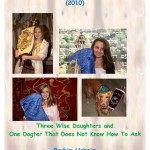Main Piece: “So my dad makes these…um…books with all the different prayers that you… um… do on Passover and it has all that information but it also has little fun snippits in it including a festive front cover with my family’s pictures having to do with the biblical story in some way. And they often feature my horse and in the past, my dog, with matzoh in their mouths. So that’s always fun. And it usually includes some sort of news information on what’s happening in the world today.”
Background: The informant says these books have been used as long as she can remember (at least 21 years). She says her father likes making people laugh and likes to personalize the books with photos of their animals because he wants Passover to be enjoyable. According to the informant, her father also likes to share his political viewpoints concerning current events to inspire conversation during dinner. Each member of the table looks through the book at the seder. Her father uses the book, in Hebrew referred to as “haggadah,” in a traditional but contemporary way. It is read back to front, like the Torah. The informant also notes that her father keeps the book a surprise until the night of the dinner.
Performance Context: I sat at my desk while the informant sat across from me in a chair.
My Thoughts: The informant’s father places value on celebrating the holiday, rather than simply reciting the Hebrew prayers and practicing the rituals. Instead, he makes the books relevant, surprising, and humorous in a modern context. Hosting a Passover dinner for many people of many backgrounds is difficult, but engaging the entire table is even more of a challenge. The informant’s celebration of Passover is unique to her family. It has been tradition for over 21 years and incorporates a sense of enjoyment and festivity. The informant’s father has adapted the original haggadah to fit a contemporary context, considering current events, humor, and the guests’ engagement. The personalization of the books is similar to a copyright. There is a sense of ownership in this creative work, shared only with the guests at the Passover dinner.

